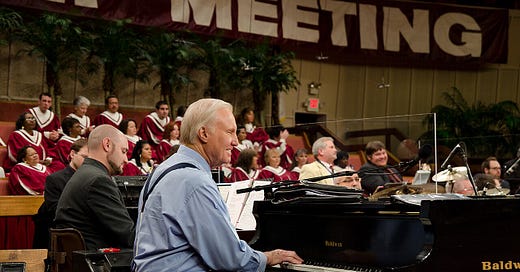Jimmy Swaggart is dead; his hateful legacy will not be forgotten
He was no voice of God. His ministry hurt women, LGBTQ people and the poor.
Photo: Wikimedia Commons.
Jimmy Swaggart has died. May he rest in peace.
And may we be honest about the legacy he leaves behind.
There is something deeply tragic in Swaggart’s brand of Christianity—one forged in fiery sermons and shame-soaked altars, polished to gleam under studio lights and television cameras, and broadcast into living rooms like the voice of God itself. But it was not God’s voice that so many heard. It was a cry of fear, judgment, and manipulation wrapped in scripture, aimed especially at those who were already made to feel like outsiders: women, children, LGBTQ people, the poor, the brokenhearted.
For decades, Jimmy Swaggart preached a Gospel that was anything but good news. His version of Christianity demanded rigid obedience to a God without mercy, a God who would cast you into Hell not for violence or injustice—but simply for being born different. Swaggart’s doctrine turned the sacred into a weapon, and many LGBTQ people grew up afraid not just of being rejected by their communities, but of being hated by the very God who made them. What kind of Gospel does that? What kind of Christ?
This was not the Jesus who touched lepers and welcomed outcasts. This was not the God of mercy who lifts the lowly and binds the wounds of the broken. This was something else entirely—a Gospel contorted into a cudgel of control.
And then there was the prosperity Gospel he sold, slick and seductive. He told the poor their poverty wasn’t a matter of injustice or misfortune—it was their own fault for not giving enough. Not enough money. Not enough belief in his leadership. He made himself the intermediary of blessings, convincing desperate people that their suffering could be solved by writing one more check. It was spiritual extortion wrapped in holy language. And people bought in—because when you’re drowning, you’ll grab any hand that’s offered.
But what Swaggart offered wasn’t a lifeline. It was a noose tied to shame and false promises.
I do not write this in rage, but in lament. Because the people who suffered under his preaching were not abstractions. They were boys and girls who grew up thinking God hated them. They were women taught to stay silent, to submit, to endure. They were queer teens whose suicides were never named in his sermons—but whose blood is part of that stained altar cloth.
Still, I hope he is in heaven. Not because I believe he was right. But because I believe God is.
I hope he sees now the faces of all those he hurt. I hope he is welcomed by the very people he condemned. I hope the God of infinite mercy has made it clear to him: You got it wrong. But I still love you. I hope he is finally free from the fear and hate he preached—and I hope he is ashamed. Ashamed, but redeemed. That is mercy. That is grace.
Rest in peace, Jimmy Swaggart. And may we all strive for a better Gospel than the one you gave us.




